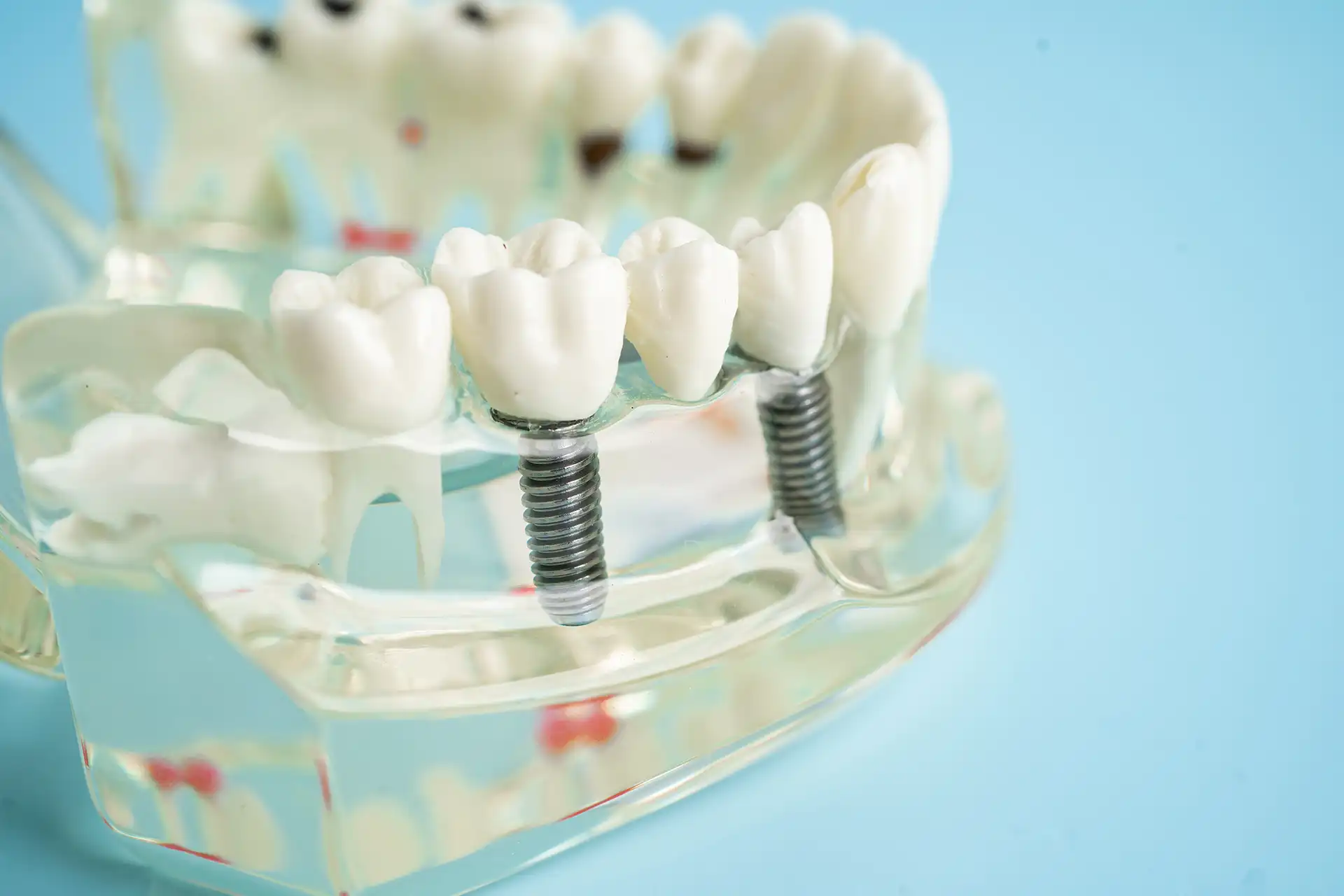İmplant Başarısızlığı Hakkında Eksiksiz Rehber: Nedenleri, Belirtileri ve Çözümleri
İmplant Başarısızlığı Hakkında Eksiksiz Rehber: Nedenleri, Belirtileri ve Çözümleri
Diş implantı başarısızlığının nedenlerini ve belirtilerini nasıl fark edebileceğinizi öğrenin. Gerçek hasta deneyimleriyle desteklenen bilgilerle, olası sorunları önleyip tedavi seçeneklerini keşfedin.
İçindekiler
- Diş İmplantı Başarısız Olursa Ne Olur?
- Erken ve Geç Dönem İmplant Başarısızlığı
- Diş İmplantı Başarısızlığı Belirtileri Nelerdir?
- Diş İmplantı Başarısızlık Oranı: Araştırmalar Ne Diyor?
- Diş İmplantı Başarısızlığında Sorumluluk Kimde?
- Diş İmplantı Başarısızlığı Tedavisi: Düzeltilebilir mi?
- Reddit’te Diş İmplantı Başarısızlığı: Gerçek Hasta Deneyimleri
- Diş İmplantı Başarısızlığı Nasıl Önlenir
-
Diş İmplantı Başarısız Olursa Ne Olur?
Şimdi, çoğu kişinin pek konuşmadığı bir konudan bahsedelim: Diş implantı başarısız olursa ne olur? Her ne kadar nadiren gerçekleşse de —özellikle deneyimli bir uzman tarafından yapıldığında— bu mümkündür ve olası senaryoları bilmekte fayda var.
Eğer implant "tutmazsa" (yani çene kemiğinizle düzgün şekilde kaynaşmazsa), gevşek hissettirebilir ya da diş etleriniz şişmiş veya ağrılı olabilir. Genellikle bu belirtiler ilk birkaç ayda ortaya çıkar. Böyle bir durumda implantın çıkarılması gerekebilir ve diş hekiminiz genellikle bir süre bekledikten sonra tekrar deneme yapar — çoğu zaman kemik grefti ile bölge güçlendirilir.
Uzun vadede tedavi edilmeyen başarısız implantlar kemik kaybına, dişlerin kaymasına veya ısırma şeklinizin değişmesine yol açabilir. Ayrıca, taçlar (kron), köprüler ya da tam çene implantları gibi ileri tedavi planlarınızı geciktirebilir veya karmaşık hale getirebilir.
Sonuç? Diş implantı başarısız olursa ne olacağını merak ediyorsanız, en önemli şey erken fark edilmesidir. Diş hekiminizle yakın temas halinde olmak, düzenli kontroller ve iyi ağız hijyeni sağlamak, olası sorunların en baştan önlenmesine yardımcı olur.
Erken ve Geç Dönem Diş İmplantı Başarısızlığı
Bir diş implantı yaptırdınız (ya da yaptırmayı düşünüyorsunuz) ve "ne zaman, ne olabilir?" diye merak ediyorsunuz. O zaman erken ve geç dönem diş implantı başarısızlıklarını dürüstçe konuşalım.
Erken Dönem Başarısızlık Nedir?
Erken başarısızlık genellikle ameliyattan sonraki ilk üç ila dört ayda ortaya çıkar. Bir miktar rahatsızlık tamamen normaldir (sonuçta ağzınıza cerrahi müdahale yapıldı!), ancak ağrı bir haftadan uzun sürüyor ya da gittikçe artıyorsa, mutlaka kontrol edilmelidir.
Bazen bu durum implant bölgesindeki enfeksiyondan kaynaklanır —özellikle sigara içiyorsanız, otoimmün bir hastalığınız varsa ya da ağız hijyeniniz zayıfsa.
Başka nedenler de olabilir mi? Evet. "Mikro hareketler" gibi durumlar, yani implant yeterince stabil değilken hareket etmesi ve kemiğe tam kaynamadan önce yerinden oynaması da başarısızlığa neden olabilir. Bu, sahte diş çok erken takılırsa daha yaygındır. Ayrıca çene kemiğinde yeterli destek yoksa ya da titanyuma alerjiniz varsa (eğer titanyum implant kullanıldıysa, zirkonyum değilse) bu da sorunlara yol açabilir.
10 Yıl Sonra Diş İmplantı Başarısızlığı
İlk ayları sorunsuz atlatsanız bile, yıllar sonra da komplikasyonlar gelişebilir. Yıllar sonra implant başarısızlığı nadirdir ama mümkündür. Sinir hasarı, implantın gevşemesi ya da vücudun implantı reddetmesi gibi durumlar yaşanabilir. Özellikle üst çenede, bazı implantlar zamanla sinüs boşluğuna doğru kayabilir.
Diş İmplantı Başarısızlığı Belirtileri Nelerdir?
Diş implantınızda bir şeylerin yolunda gitmediğini mi düşünüyorsunuz? Yalnız değilsiniz — erken belirtileri bilmek çok önemlidir. Diş implantı başarısızlığının en yaygın belirtilerinden biri, çiğneme zorluğudur —özellikle daha önce böyle bir rahatsızlık yoksa.
Diş etlerinde iltihap ya da implant çevresinde diş eti çekilmesi de fark edebilirsiniz. Diğer uyarı işaretleri neler mi? Geçmeyen ya da kötüleşen şişlik, hatta bazen implantın gevşemesi —evet, tıpkı sallanan bir diş gibi hissedilebilir. Ve tabii ki şiddetli ağrı veya rahatsızlık, iyileşme süreci geçtikten sonra kesinlikle normal değildir.
“Vücudum diş implantını reddediyor olabilir mi?” diye soruyorsanız, bu erken belirtiler birer ipucu olabilir. Bu işaretlere dikkat edin ve diş hekiminize danışmaktan çekinmeyin. Unutmayın, erken müdahale gülüşünüzü kurtarabilir.
Diş İmplantı Başarısızlık Oranı: Araştırmalar Ne Diyor?
Hiç diş implantı başarısızlık oranı hakkında düşündünüz mü, endişe etmeli misiniz? Güzel haber —araştırmalar diş implantlarının oldukça yüksek başarı oranına sahip olduğunu gösteriyor: genellikle %95’in üzerinde!
Bu ne anlama geliyor? Yani çoğu insan ciddi bir sorun yaşamadan implant kullanabiliyor. Elbette sigara içmek, zayıf ağız hijyeni ya da bazı sağlık sorunları riski artırabilir, ama doğru bakım ile implantlar uzun ömürlü olur.
Bu yüzden implant yaptırmayı düşünüyorsanız, kişisel risk faktörlerinizi mutlaka diş hekiminizle konuşun. Diş implantı başarısızlık oranını bilmek, sürece daha bilinçli yaklaşmanıza ve kendinizi daha güvende hissetmenize yardımcı olur.
Diş İmplantı Başarısızlığında Sorumluluk Kimde?
Peki, diş implantı başarısız olursa sorumluluk kimde —diş hekiminizde mi yoksa sizde mi? Bu sorunun cevabını bilmek çok önemli!
Açık konuşalım: Aslında ikinizin de sorumluluğu var. Diş hekiminizin tedaviyi doğru planlaması, kemik sağlığınızı kontrol etmesi ve implantı doğru yerleştirmesi gerekir. Ama sizin tarafınızda da sigara içmek, temizlikleri aksatmak ya da bakım talimatlarına uymamak gibi hatalar süreci olumsuz etkileyebilir. Bu bir ekip çalışmasıdır!
Ancak, implant kötü planlama veya cerrahi hatalar yüzünden başarısız olursa bu durum tıbbi ihmal (malpraktis) kapsamında değerlendirilebilir. Bu nedenle bilgilendirilmiş onam (rıza) ve açık iletişim çok önemlidir.
Kimin sorumlu olduğunu bilmek, kendinizi daha hazırlıklı ve güvende hissetmenize yardımcı olur.
Başarısız Bir Diş İmplantı Düzeltilebilir mi?
Muhtemelen şu soruyu soruyorsunuz: Başarısız bir diş implantı düzeltilebilir mi?
Cevap: Evet, çoğu durumda düzeltilebilir!
İlk etapta korkutucu gelebilir ama paniğe gerek yok. Eğer implantınız gevşekse, ağrıyorsa ya da çevresindeki diş etlerinde şişlik varsa, bir şeyler ters gidiyor olabilir. İyi haber şu ki, diş hekimlerinin bu tür sorunları çözmek için birçok yöntemi var —tabii sorunun kaynağına bağlı olarak.
Bazen sadece bir enfeksiyon tedavisi ya da kuron ayarı yeterli olabilir. Daha ciddi vakalarda implantın çıkarılıp yeniden yapılması gerekebilir —ama yine de birkaç seçeneğiniz var.
Erken fark etmek çok önemli. Bu nedenle alışılmadık belirtileri göz ardı etmeyin. Bir sorun olduğunu düşünüyorsanız, en kısa sürede kontrol randevusu alın. Diş implantı düzeltilebilir bir şeydir —doğru bakım ve uzmanlıkla.
Unutmayın: Gülüşünüz her şeye değer! Düzenli temizlik ve iyi ağız hijyeni, gelecekteki sorunları önlemek için çok önemlidir. Önlem ve erken müdahale her zaman kazandırır.
Reddit’te Diş İmplantı Başarısızlığı: Gerçek Hasta Deneyimleri
Son zamanlarda Reddit'te diş implantı başarısızlığıyla ilgili başlıkları incelediyseniz, yalnız değilsiniz. İmplant yaptırmayı düşünen birçok kişi aynısını yaptı —ve açıkçası, bu oldukça aydınlatıcıydı.
Neden mi? Çünkü gerçek insanlar kendi deneyimlerini paylaşıyor —iyi olanları da, kötü olanları da. Birçok kullanıcı enfeksiyon, zayıf iyileşme ya da implantın kemiğe düzgün kaynamaması gibi sorunlardan bahsediyor. Bunlar genellikle sigara kullanımı, takip randevularının aksatılması ya da kemik yoğunluğunun düşük olması gibi yaygın nedenlerle ilişkilendiriliyor.
Ama sizin için en faydalı olan ne mi? İnsanların kendi yaşadıklarından çıkardığı derslerle verdikleri tavsiyeler: Güvenilir bir klinik ve deneyimli bir cerrah seçmek, iyileşme sürecini aceleye getirmemek gibi.
Reddit’teki bu tür paylaşımları okumak, neyle karşılaşabileceğiniz konusunda daha net bir fikir edinmenizi sağlar. Diş koltuğuna oturmadan önce perde arkasını görmek gibi. Endişeliyseniz, bu doğrudan deneyimler sizi daha hazırlıklı ve bilinçli kılabilir.
Diş İmplantı Başarısızlığı Nasıl Önlenir?
Diş implantı başarısızlığı nasıl önlenir diye mi düşünüyorsunuz? Merak etmeyin —aynı endişeyi ben de yaşadım. İyi haber şu ki, her gün uygulayabileceğiniz bazı basit alışkanlıklarla riskleri büyük ölçüde azaltabilirsiniz.
-
Her gün diş implantınızı gerçek bir diş gibi fırçalayın, diş ipi kullanın ve ağız gargarası ile durulayın.
-
6 ayda bir düzenli diş kontrolleri yaptırın —erken tespit çok şey değiştirir.
-
Sigara içiyorsanız bırakın —çünkü sigara iyileşmeyi yavaşlatır.
-
Diyabetiniz varsa, kontrol altında tutmaya çalışın.
-
Yoğurt, brokoli gibi kalsiyum açısından zengin besinler tüketin.
-
Diş hekiminiz önerdiyse, gece plağı kullanarak diş sıkma/gnashing sorunlarını önleyin.
-
Buz ya da sert şeker gibi şeyleri çiğnemekten kaçının —implantınız size minnettar olur.
Sonuç olarak? Küçük yaşam tarzı değişiklikleri bile implantınızın uzun ömürlü ve başarılı olmasına büyük katkı sağlar!
Türkiye’deki Autora Kliniği olarak, uzun yıllara dayanan deneyime sahip uzman diş hekimlerimizle diş implantı başarısızlığını önlemek için buradayız. Her türlü sorununuz için bizimle iletişime geçmekten çekinmeyin —tüm süreci sizin için açıklığa kavuşturacağız!
Sources:
Ücretsiz danışmanlık almak için doldurun
her implantta yenilik ve hassasiyet
ömür boyu gülüşler için güçlü temeller sağlayan implantlar kullanıyoruz
BioTec Dental Implants


Hiossen Dental Implants


Straumann Dental Implants


Nobel Biocare Dental Implants


MegaGen Dental Implants


ışıltılı gülüşler ebedi olarak yakalanır
gerçek gülüşler gerçek sözler hastalarımızın hikayeleri






